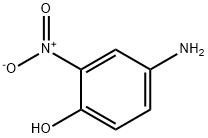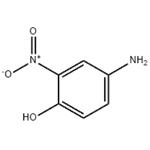Chemical Properties
DARK BROWN FINE CRYSTALLINE POWDER
Chemical Properties
4-Amino-2-nitrophenol is a dark red crystalline or reddish-purple solid.
Uses
4-Amino-2-nitrophenol has been used in dyeing human hair
and animal fur. The typical concentration in the “semipermanent”
hair dyes was estimated to be on the order of
0.1–1.0%.
Uses
4-Amino-2-nitrophenol was used in determination of aminonitrophenols in hair dyes by differential pulse voltammetry and HPLC with electrochemical detection. It is commonly used as semipermanent (nonoxidative) hair colorant and toner in permanent (oxidative) hair dye products.
Definition
ChEBI: 4-Amino-2-nitrophenol is a member of 2-nitrophenols.
General Description
Dark red plates, needles or reddish-purple powder. Melting point 125-127°C.
Air & Water Reactions
Sensitive to oxidation upon prolonged exposure to air. Insoluble in water.
Reactivity Profile
4-Amino-2-nitrophenol may react with strong oxidizing agents, strong bases, acid chlorides and acid anhydrides .
Fire Hazard
Flash point data for 4-Amino-2-nitrophenol are not available. 4-Amino-2-nitrophenol is probably combustible.
Safety Profile
Suspected carcinogen
with experimental carcinogenic data. Very
poisonous by intraperitoneal route.
Moderately toxic by ingestion. A severe eye heated to decomposition it emits toxic
fumes of NOx.
Potential Exposure
In dye formulation for furs and hair
Carcinogenicity
Under the conditions of the bioassay, the compound was
carcinogenic in male rats inducing transitional cell carcinomas
of the urinary bladder (controls 0/15, lowdose 0/46, high
dose 11/39). The same tumor was also observed in three
dosed female rats and may have been associated with the
administration of the chemical. No evidence of carcinogenic
activity was found in the mice.
Shipping
UN2811 Toxic solids, organic, n.o.s., Hazard Class: 6.1; Labels: 6.1-Poisonous materials, Technical Name Required. UN3143 Dyes, solid, toxic, n.o.s. or Dye intermediates, solid, toxic, n.o.s., Hazard Class: 6.1; Labels: 6.1-Poisonous materials, Technical Name Required
Incompatibilities
Incompatible with oxidizers (chlorates, nitrates, peroxides, permanganates, perchlorates, chlorine, bromine, fluorine, etc.); contact may cause fires or explosions. Keep away from alkaline materials, strong bases, strong acids, oxoacids, epoxides. It is unknown if this nitro compound is explosive; some are flammable and explosive, and the contact with alkali increases thermal sensitivity of these materials.




